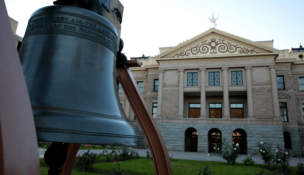Judge rules against lawmakers in election lawsuit
Howard Fischer, Capitol Media Services//August 13, 2024//[read_meter]
Judge rules against lawmakers in election lawsuit
Howard Fischer, Capitol Media Services//August 13, 2024//[read_meter]
Republican lawmakers provided a skewed view for voters of an initiative drive for open primaries and must fix it, Maricopa County Superior Court Judge Melissa Julian has ruled.
In a new decision, the judge does not dispute that the description, which will be sent to the homes of all registered voters, contains all the provisions of what would be Proposition 140.
But Julian, an appointee of the former Gov. Doug Ducey, said that it was arranged in a way to mislead voters about how the proposal would affect future elections. And she said that was done on purpose “to dissuade voters from supporting the initiative.”
The judge ordered the Republican-controlled Legislative Council, which crafted the description, to fix it.
But that won’t happen just yet. House Speaker Ben Toma, R-Peoria, who chairs the panel, said Tuesday he intends to appeal.
At issue is what voters will be told about what has been informally referred to as an “open primary” but is more accurately termed a “jungle primary.”
The measure would scrap partisan political primaries in favor of a single non-partisan election where all candidates run against each other, regardless of political affiliation. It also would permit anyone to choose no matter how they were registered to vote.
Supporters operating as Make Elections Fair contend it would ensure that all Arizonans have a chance to determine who advances to the general election.
Under the current system, each party’s candidate is generally chosen by only those who are registered with that party. The argument is that it results in nominees who tend to appeal largely to the hard-core adherents.
And with one party or the other having a large voter registration edge in most legislative and congressional districts, they said that can make whoever survives the primary the de facto winner in November.
State law requires the Legislative Council to craft an “impartial” description of each ballot measure.
Julian said what the panel approved does accurately describe the change in the primary process.
What it also describes, she said, is what happens after that. That includes allowing the Legislature to decide whether only the top two vote-getters advance to the general election.
But it also permits lawmakers – or the secretary of state if they don’t act – to allow up to five to go on to November. And only in that case, it would require the use of “ranked-choice voting” to decide who is elected.
What Julian found illegal is that the first provision cited by the Legislative Council in its summary for voters is that Prop 140 would “allow for the use of voter rankings at all elections held in this state to determine which candidate received the highest number of legal votes.”
Only thing, the judge said, is that the initiative only allows and does not require setting up a system of ranked-choice voting.
“The analysis … selectively emphasizes that the initiative would ‘amend’ the constitution to provide for the use of voter ranking to declare election winners,” Julian wrote.
“In doing so, the analysis misleadingly suggests that if the initiative is enacted, the candidate who receives the most votes would no longer be declared the winner in ‘all’ Arizona elections,” the judge continued. “This is inaccurate.”
She said failing to mention the conditions under which ranked-choice voting would be required, but yet putting that first, ahead of describing changes to the primary election system “renders the analysis misleading.”
There is some verbiage later in the description about voter-ranking provisions. But Julian said this is set up in a way to encourage readers to “skip over several key provisions” that explain how multiple candidates can advance from the primary election and how voter ranking would be used in those limited circumstances.
“This is rhetorical strategy devised to dissuade voters from supporting the initiative by confusing when and how voter ranking would be used under the initiative and implying that its use would result in the unfair election of candidates who did not receive the highest number of votes,” the judge wrote. “Such a strategy is tinged with partisan coloring and violates the requirement of neutrality.”
Julian also brushed aside claims that the summary was worded that way, and in that order, to help voters understand what Proposition 140 would do.
“If anything, the summary reference to voter ranking being ‘allowed’ to determine election winners makes the analysis more confusing as it implies voter ranking would supplant the current system where the person with the majority of votes wins the election,” she wrote. “The selective emphasis on voter ranking does not reflect a good faith effort to make the initiative easier to understand.”
The judge also noted that the attorney for Make Elections Fair discussed the order in which the provisions of the initiative were to be described, telling lawmakers the placement of the section on ranked-choice voters is “potentially confusing to voters” and suggesting it be moved lower. But the council did not enact his proposed change.
None of this finally resolves the question of whether Proposition 140 will be on the ballot.
A different judge ruled last week that the initiative does not violate rules which prohibit more than one issue from being presented to voters in a single ballot measure.
But the Arizona Free Enterprise Club continues to argue that some petition circulators did not properly register, invalidating all the signatures they collected, potentially leaving the measure short of the 383,923 valid names needed to go on the Nov. 5 ballot.
Hearings continue this week on that issue.
















